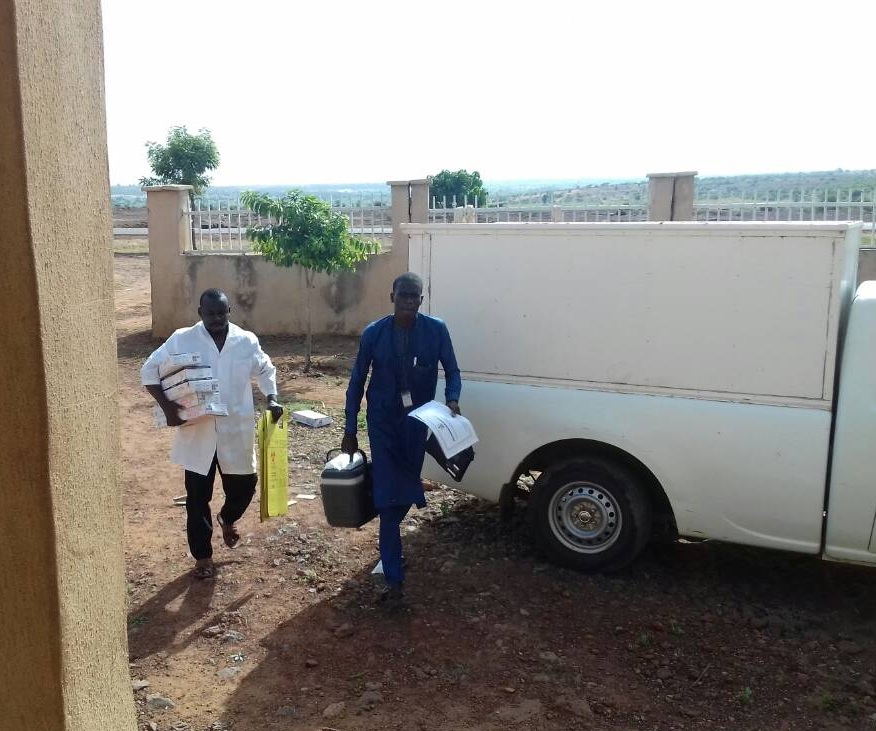Hasiya Abdullahi with her set of twin after granting interview to eHA-ANRiN Communications team in Kaduna
18-year-old Adolescent woman, Hasiya Abdullahi happily shares a story of how she used contraceptives for the first time to prevent unplanned pregnancies after several birth complications that resulted in miscarriage and death of her 2 children. Married at 15, Hasiya, had no experience with family planning or child spacing methods.
Although Hasiya has heard a lot about family planning, she never considered uptake due to fears of complications and side effects caused by misinformation. “ I first heard about the different methods of family planning in the health facility where we used to visit for immunization after delivery. I was not really aware of how it works, but in our community, I have heard so many scary stories regarding family planning. These stories were very frightening” Hasiya recalls. “Because of the frightening nature of the stories I heard, I decided not to use the family planning methods because I was told that if I use the method I will become sick, appear skinny with a protruding tummy, and that I will also lose blood.” She adds.
Misinformation, religious belief, spousal disapproval, myth and wrong perceptions remain a major barrier to the uptake of family planning services, especially in Northern Nigeria. Knowledge about family planning continues to increase in Nigeria over the years, but most adolescent women do not make use of family planning services. Hasiya says that “a lot of women have all sorts of beliefs about family planning, including my sisters”
Maternal health outcomes in Nigeria have continued to be of great concern. According to the World Health Organization, the Maternal Mortality Rate (MMR) in Nigeria is 814 per 100,000 live births as a prime contributor to this disturbing figure with its Maternal mortality ratio estimated at 1,025 deaths per 100,000 live births (NBS 2012).
Thanks to the Accelerating Nutrition in Nigeria (ANRiN) project being implemented by an eHealth Africa-led Consortium across 12 LGAs in Kaduna state, Adolescent women of a reproductive age like Hasiya Abdullahi are accessing better information and counseling about family planning through aggressive community outreach programs and other peer-to-peer campaigns at home, leading to demand for and uptake of Adolescent Health Services in targeted communities.
Through a cohort of highly trained service providers and community health extension workers, Hasiya and 23,019 other Adolescent women have been reached and provided with Adolescent Health Services in 6 of the 12 LGAs that the eHA Consortium is implementing the ANRiN project (Kaduna North, Kaduna South, Chikun, Kachia, Zango and Jema’a)
““They (Service providers) visited me at home, sensitized and counseled me about family planning and all its benefits and how it can help me and my family to live a very happy and healthy life. They really enlightened me and I became convinced and decided to take up the family planning method. In doing that, I had to discuss with my husband also to convince him and he consented” says Hasiya”
Of all the options she was provided during counseling including use of female and male condom, pills, injectables, implanon, Jadelle, and Intra-uterine Contraceptive Device (IUCD), Hasiya says she chose implanon which was inserted into her left arm at the nearest health facility she was escorted to by the service providers. “And since they inserted the implanon, I have not witnessed any complications. I was not sick, and I did not see any side effects” she said. “I adopted the family planning method after giving birth to my set of twins. Now I noticed that they are quite healthier than the rest because I can now take proper care of them now that I am not pregnant and breastfeeding at the same time.
“I am really happy because a few years back, I gave birth to one of my children and conceived again almost immediately after the childbirth. This affected the baby who became very sick and even lost his life in the process because I couldn't take proper care of the baby and manage the unplanned pregnancy at the same time.
“But now my set of twins are healthy because I adopted family planning which allows me to give them the best of care without getting pregnant immediately”
Hasiya is now an AHS champion enlightening other women on the benefits of family planning in her community. “With what I witnessed, I use my own experience as an example to sensitize other women who do not believe in the method. I recently told my sisters about this and both of them have also taken up family planning” a visibly elated Hasiya stated.
The changes witnessed by Hasiya and many other Adolescent women who have been reached through the ANRiN project is a testament to the work of community outreach and mobilization effort of service providers. eHA and its consortium partners prioritize regular training for service providers to improve their skills and provide them with job aids and other work tools and has also set up an e-learning platform that serves as a knowledge base for the service providers.
One thing that stands out in this ANRiN project is the component that makes it community based. Service providers are resident in the communities where the project is implemented. They adopt house to house visits to bring the service to beneficiaries' door steps. This increases access and uptake of services.
Adolescent Health services, a component of the ANRiN project was initially piloted in 2 out of the 12 LGAs the eHA led consortium is implementing and this has since extended to 5 other LGAs. The project is funded by the World Bank in partnership with the Kaduna state government as part of effort to increase management and control of micronutrient deficiency, improve maternal nutrition, decrease low birth weight and associated morbidities, increased awareness and utilization of adolescent health services and increased capacity of health workers in the delivery of AHS.
The ANRiN project, through a mix of counseling and service delivery, aims to increase utilization of quality, cost-effective nutrition services for pregnant and lactating women, adolescent girls and children under five years of age in high-malnutrition burden states of Nigeria.











In the last 6 months (Jan-June), over 2 million vaccines have been delivered to average of 351 cold-chain equipped health facilities monthly, leading to the immunization of over 800,000 children against Vaccine preventable diseases in Sokoto State